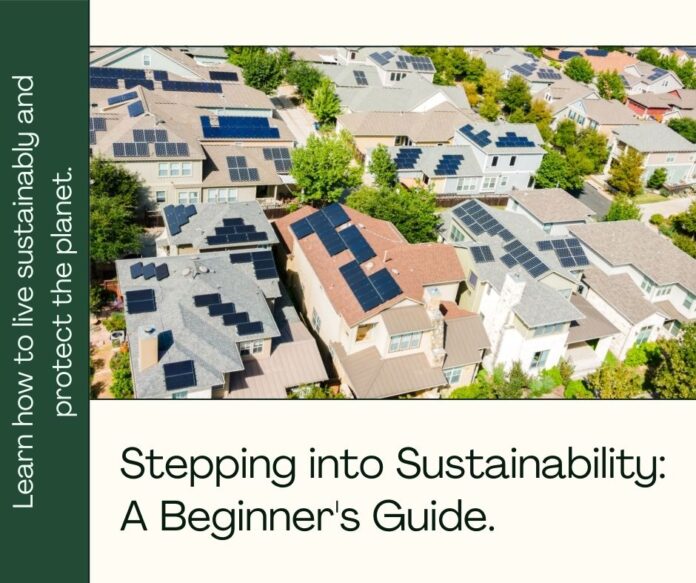Last Updated on February 6, 2024 by Silvy
Stepping into Sustainability: A Beginner’s Guide to Living Green
Imagine a world where your daily choices, like choosing a reusable water bottle or opting for locally grown produce, ripple outwards, creating a gentler impact on the planet we share. Sounds pretty awesome, right? That’s the essence of sustainable living, a philosophy that prioritizes both our well-being and the environment.
But where do you even begin, especially if you’re a wide-eyed newbie eager to make a difference? Fear not, eco-warrior! This guide will equip you with the knowledge and inspiration to kickstart your sustainable journey, transforming your dreams into tangible actions.
Think of sustainable living as a tapestry woven with countless threads, each representing a conscious choice you make. It’s not about drastic changes overnight, but about weaving in small, sustainable habits that become second nature. It’s about understanding the interconnectedness of our planet and its inhabitants, realizing that every action, big or small, has a ripple effect.
But where do you pick up your first thread? The beauty of sustainability lies in its adaptability. Whether you live in a bustling city or a serene rural town, there are countless ways to contribute to a greener future. Start by reducing your consumption.
Ask yourself, “Do I really need this?” before buying something new. Opt for durable, long-lasting products and embrace the power of “reduce, reuse, recycle.”
Embrace the power of efficiency. Turn off lights when not in use, unplug electronics, and air-dry clothes whenever possible. Consider investing in energy-efficient appliances and explore renewable energy options like solar panels if feasible. Every watt saved is a victory for the planet and your wallet.
Your food choices hold immense power. Opt for locally sourced, seasonal produce, minimizing transportation emissions and supporting local farmers. Embrace plant-based meals more often, as animal agriculture has a significant carbon footprint.
Minimize food waste by planning meals, storing food properly, and composting leftovers. Remember, every bite is a chance to make a conscious choice.
Travel consciously. Explore greener ways to get around. Walk, cycle, or use public transportation whenever possible. If driving is unavoidable, carpool, choose fuel-efficient vehicles, and practice eco-friendly driving habits. When it comes to vacations, consider destinations reachable by train or eco-friendly accommodations. Remember, the journey can be just as sustainable as the destination.
Embrace sustainable fashion. Fast fashion is a major environmental culprit. Extend the life of your clothes by repairing, swapping, and buying secondhand. Opt for natural fabrics like cotton and linen, and invest in quality pieces that will last longer. When you do buy new, prioritize brands with sustainable practices. Remember, style doesn’t have to come at the cost of the planet.
Clean green. Ditch harsh chemicals and embrace eco-friendly cleaning solutions. Vinegar, baking soda, and lemon juice are powerful natural cleaners. Opt for refillable cleaning products and choose biodegradable options whenever possible. Remember, a clean home doesn’t have to come at the expense of a clean planet.
Remember, you’re not alone on this journey! Connect with others through online forums, local groups, or sustainability events. Share your experiences, learn from others, and inspire each other on this path towards a greener future.
Every action you take, every thread you weave, contributes to a tapestry of positive change. So, take a deep breath, grab your metaphorical needle and thread, and embark on your own sustainable adventure. The planet, and your future self, will thank you for it.

Why Embrace Sustainability?
Think of it like this: our planet is a finite resource, and our current consumption habits are pushing its limits. Sustainability is about ensuring we meet our needs without compromising the ability of future generations to do the same. It’s about leaving a legacy of a healthy planet, not a depleted one. But beyond the big picture, there are personal benefits too. Sustainable choices often translate to healthier lives, lower expenses, and a deeper connection to the natural world.
Start Small, Dream Big: Practical Steps for Everyday Green Living
Remember, even the smallest changes, when multiplied by millions, can create a significant impact. So, instead of feeling overwhelmed, focus on incorporating these simple yet effective practices into your routine:

1. Reduce, Reuse, Recycle: This mantra serves as the cornerstone of sustainable living. Reduce your consumption by opting for durable products, buying less stuff, and avoiding single-use plastics. Reuse whenever possible – turn old jars into containers, clothes into cleaning cloths, and so on. Finally, recycle diligently, learning about your local recycling guidelines and separating waste accordingly.
2. Embrace Energy Efficiency: Ditch the energy vampires! Switch to LED light bulbs, unplug unused electronics, and air-dry clothes whenever possible. Consider investing in energy-efficient appliances and exploring renewable energy options like solar panels if feasible. Remember, every watt saved is a win for the planet and your wallet.
3. Be Water Wise: Every drop counts! Shorten your showers, fix leaky faucets, and collect rainwater for watering plants. Opt for water-efficient appliances and consider installing a low-flow showerhead to further reduce your water footprint.
4. Eat Green, Live Green: Did you know your food choices can impact the environment? Opt for locally sourced, seasonal produce to reduce transportation emissions and support local farmers. Embrace plant-based meals more often, as animal agriculture has a significant carbon footprint. Minimize food waste by planning meals, storing food properly, and composting leftovers.
5. Travel Consciously: Explore greener ways to get around. Walk, cycle, or use public transportation whenever possible. If driving is unavoidable, carpool, choose fuel-efficient vehicles, and practice eco-friendly driving habits. When it comes to vacations, consider destinations reachable by train or opting for eco-friendly accommodations.
6. Embrace Sustainable Fashion: Fast fashion is a major environmental culprit. Extend the life of your clothes by repairing, swapping, and buying secondhand. Opt for natural fabrics like cotton and linen, and invest in quality pieces that will last longer. When you do buy new, prioritize brands with sustainable practices.
7. Clean Green: Ditch harsh chemicals and embrace eco-friendly cleaning solutions. Vinegar, baking soda, and lemon juice are powerful natural cleaners. Opt for refillable cleaning products and choose biodegradable options whenever possible.
8. Conserve and Protect: Nature is our lifeblood. Support organizations working to protect our environment. Plant trees, volunteer for clean-up drives, and spread awareness about sustainable living. Remember, every action, big or small, contributes to a healthier planet.

Remember, you’re not alone! The sustainable living community is welcoming and supportive. Connect with others through online forums, local groups, or sustainability events. Share your experiences, learn from others, and inspire each other on this journey towards a greener future.
FAQs
Is sustainable living expensive?
Not necessarily! Many sustainable practices actually save you money, like reducing energy consumption or buying less stuff. While some eco-friendly products may have a higher upfront cost, their durability and long-term benefits often outweigh the initial investment.
What if I can’t do everything perfectly?
Don’t get discouraged! Progress, not perfection, is key. Celebrate your small wins, learn from your mistakes, and keep moving forward.
Is sustainable living realistic for someone living in a city?
Absolutely! In fact, city life often presents unique opportunities for sustainable living. Many cities offer excellent public transportation systems, walkable neighborhoods, and a plethora of farmers markets for locally sourced produce. Additionally, numerous initiatives like community composting programs and eco-friendly businesses make it easier to adopt sustainable practices in urban environments.
How can I get my family involved in sustainable living?
Engaging your family is crucial for long-term impact. Involve them in choosing eco-friendly products, planning sustainable meals, and participating in local environmental activities. Turn sustainability into a fun and collaborative project, like planting a vegetable garden together or hosting a clothing swap party. Remember, leading by example and making small changes together foster a culture of sustainability within your household.
Where can I find more resources on sustainable living?
A wealth of information is available online and in your community. Check out websites like the Environmental Protection Agency (EPA), National Resources Defense Council (NRDC), and local sustainability organizations. Many libraries offer books and documentaries on the topic. Don’t forget the power of social media! Connect with eco-conscious influencers, join online communities, and stay informed about the latest trends in sustainable living.
Remember, embracing sustainability is a journey, not a destination. Celebrate your progress, learn from setbacks, and keep inspiring others to join you on the path towards a greener future.
By making informed choices and taking action, we can collectively create a world where environmental responsibility and well-being go hand in hand. Let’s leave a legacy of a thriving planet for generations to come!
Disclaimer: The information provided in this article is for general informational purposes only and should not be construed as professional advice. Please consult with qualified professionals for personalized guidance on sustainable living practices.
-
Reference Links:
- Project Drawdown: https://drawdown.org/: https://drawdown.org/ – This non-profit organization provides credible, science-backed solutions to tackle climate change, offering a wealth of resources and actionable steps for individuals and communities to adopt sustainable practices.
- The Ellen MacArthur Foundation: https://www.ellenmacarthurfoundation.org/: https://www.ellenmacarthurfoundation.org/ – This foundation champions the circular economy, a model that aims to eliminate waste and pollution, focusing on keeping resources in use for as long as possible. Their website offers insightful reports, case studies, and practical guidance for businesses and individuals alike.
- Global Footprint Network: https://www.footprintnetwork.org/: https://www.footprintnetwork.org/ – This organization calculates the Ecological Footprint, a metric that measures humanity’s demand on nature’s resources compared to its biocapacity. Their website offers resources to understand your own footprint and learn how to live more sustainably within our planet’s limits.


